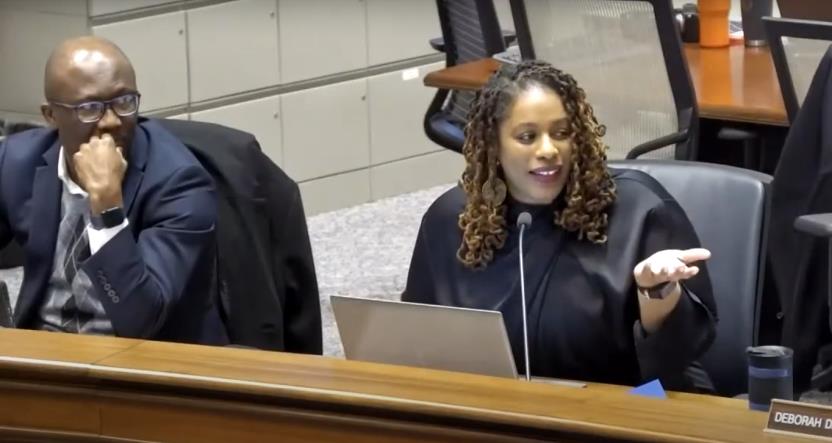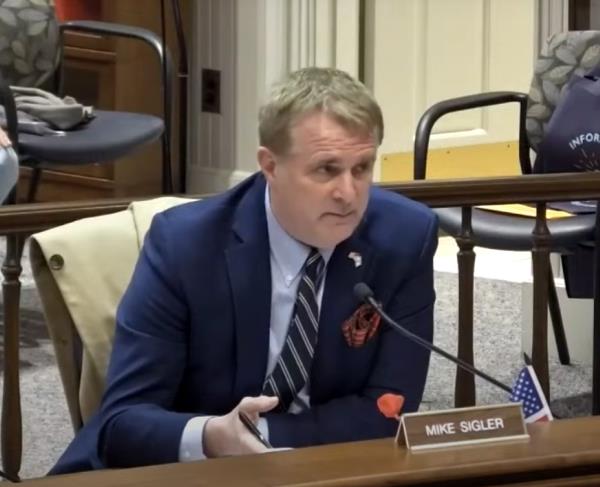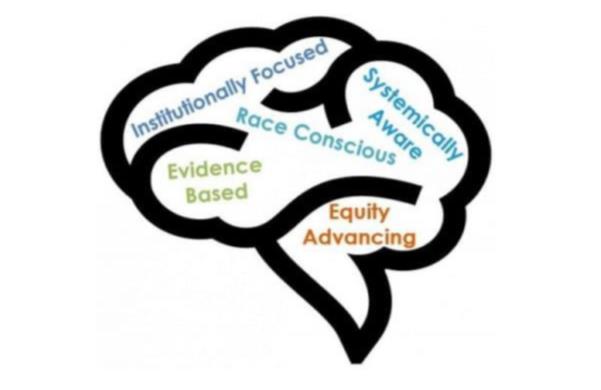
Reporting and analysis by Robert Lynch; February 21, 2025
President Donald Trump wasn’t in Tompkins County legislative chambers last Tuesday night. But his shadow was.
After a nearly hour-long debate over a matter that wasn’t even expected to have been talked about, the Tompkins County Legislature voted 10-3 along strict party lines to adopt the “Institutionalizing Equity Report,” a dense, reticularly-scripted, DEI-centric diversity roadmap heralded to become the “foundational document for embedding equity within all levels of County government” according to the words of the resolution that gave it power.
Charlene Holmes, Tompkins County’s Chief Equity and Diversity Officer (CEDO) since mid-2023, claimed credit for authorship. We’re told the 52-page, data-driven document took her two years to compile. Its text was not made part of the meeting’s published agenda, but instead hitched to it through a hard-to-find data link. The report will eventually be made “publicly accessible” on the Tompkins County website, the adopted resolution promises.

The County Legislature has long proclaimed its embrace of Diversity Equity and Inclusion (DEI). “Inclusion through Diversity” occupies a prominent position of honor as the footer of Tompkins County’s letterhead. Tompkins County was a first among upstate New York counties to recruit a Chief Equity and Diversity Officer. Its newly-hired County Administrator is African-American. So is its Commissioner of Personnel.
But with DEI having become the newly- targeted bad boy of the freshly-minted Trump Administration, the voluminous report that a majority of Tompkins’ legislators gleefully adopted Tuesday could also paint a bright, MAGA-generated bullseye on everything Tompkins County says or does. It may even cost us money.
Still, Tompkins County’s progressive Democrats eagerly raced to their battle stations February 18th to defend what CEDO Holmes had proudly and methodically written. What’s more, some lawmakers came close to tarring any colleague who might critique the report, accusing them of being someone at the inside periphery of racially-unacceptable thought.
Each of the Legislature’s three Republicans; Newfield-Enfield’s Randy Brown, Lansing’s Mike Sigler, and Groton’s Lee Shurtleff, voted against the report’s adoption. All ten Democrats voted their approval. (Ulysses’ Anne Koreman didn’t attend.)
“I’m not comfortable voting for this because I really don’t understand it,” a diffident, bewildered Randy Brown stated as he launched the marathon discussion after having pulled the report’s authorizing resolution from a multi-measure “consent agenda.” Had it languished there, lawmakers would likely have routinely ushered it to adoption without a whisper.
As the 52-minute debate dragged on, partisans threw some of the sharpest rhetorical elbows witnessed of late. Sparring started when Mike Sigler acknowledged he’d opposed creating the CEDO’s job in the first place, back in 2019.
“I took a lot of heat for that,” Sigler acknowledged about opposing creating the job that Holmes now administers. Sigler said his present concern is akin to what it was back then. “What is the metric of success?” Sigler asked. “How successful have we been when it comes to diversity, equity, and inclusiveness?”

The Ithaca Town’s Amanda Champion, one of the report’s—and Charlene Holmes’—strongest defenders, insisted the number-driven document is a success metric in itself.
“It’s pretty clear,” said Champion, “that the goal is to collect data and to find out where we’re helping people, where we’re not helping people, where departments are helping people, where departments could do better, look at some of the challenges that departments are having and help them; that’s the goal.”
To Champion, process—process alone—can gauge success. Some may demand more meat on those DEI bones.
The resolution that legislators adopted February 18th lauds the Institutionalizing Equity Report as, “a comprehensive framework to advance and embed equity across County operations,” a framework “utilizing data-driven indicators” to do so. Yes, the document too often reads like a doctoral thesis.
“Our approach to embedding and institutionalizing equity within Tompkins County’s operations is guided by a comprehensive methodology that integrates strategic planning, equity indicators, and the Equity Mindedness Framework (EMF),” page 16 of Holmes’ work product states.
And one might ask, what exactly does an “Equity Mindedness Framework” entail? Holmes defines it:
“EMF provides a comprehensive framework for organizations to institutionalize equity by using evidence to inform targeted interventions, prioritizing the needs of marginalized groups, embedding equity into institutional practices, dismantling harmful systemic structures, and continuously improving their equity efforts. This structured approach helps organizations create lasting and meaningful change towards achieving equity across all aspects of their operations and impact within their communities.”
Hmmm. Good luck to Highway Director Jeff Smith in explaining that word salad to the typical snow plow driver at the department’s next diversity training seminar. Smith shouldn’t have to explain. It’s academic circumlocution; shredded lettuce dressed up and imitate intelligent insight. (Sadly, there is no “Plain language” version.)
As Tuesday’s debate wandered on, emotions heightened, and reality crept in from the edges.

“Diversity and inclusion, I think are fairly agreed-upon concepts,” Ithaca’s Rich John remarked. “It’s the ‘equity’ word that people struggle with,” he observed, “And what does that mean? And it can mean basic fairness. But it also can support that we’re going to try to do something to address past wrongs and rebalance as a result of that… and I don’t know how we can do that, frankly.”
Rich John then drew his argument more to the point,
“We also have to recognize in the last election that there are lots of people in our community all around us that voted for the Administration that is in place right now. They’re here. They’re our neighbors. And part of what drove them to vote as they did, I believe, is a deep skepticism about DEI,” Rich John maintained. “They don’t understand it. They think it’s doing things that shouldn’t be done.”
“So I don’t think there’s truly a consensus in Tompkins County,” John posited. John, himself, doesn’t see the report as “threatening or bad,” but he fears many others do. “And I think that’s on us that we need to bring our community along on this,” he said. “I don’t think we can say there is a consensus. Sadly, there isn’t.”
Rich John called for delaying the Legislature’s vote. Delay didn’t happen.
Liberals, Democrats like Shawna Black, exuded profound unease, maybe sensing that Trump—or at least Trump-ism—had somehow stolen into legislative chambers that night.

“God, I honestly don’t even know where to begin,” Black, the Legislature’s former chair, reacted in distress; disbelief. “I (Whew) feel like I’m in the Twilight Zone right now.” Black seemed to lose her train of thought. “It’s crazy times right now,” she remarked.
“We know what our community wants, it’s loud and clear,” Black continued. There’s no question where we need to go and how we need to vote on this… I feel we’re going back to the Dark Ages even debating this.”
Legislator Travis Brooks, African American, said he’s felt the sting of prejudicial preconceptions himself. His name on a job application suggests one kind of person; his showing up for the interview reveals another. Brooks said interviewers might expect at viewing his name to hear country music. Instead they see dreadlocks and tattoos.
“When you have people that don’t look like you, when you have different backgrounds, it enriches wherever you work, and it creates diversity, it creates thought, it creates a better product for the community that you serve,” Brooks asserted.
Mike Sigler took a second turn at the mic. Sigler sensed a mood in the room he didn’t like.
“I’m a little disappointed, frankly, in some of the things that my colleagues have said, because what they’re doing is they’re making this into ‘if you don’t vote the way that I believe you should vote, that you are on the other side and don’t believe in these things.’” Sigler stated. He said that’s wrong.
The Republican lawmaker insisted the issue is not about Trump. He said he opposed the CEDO position’s creation long before the current Administration took office. And Sigler insisted that most Americans still oppose racism.
“Are there racists in the country? Yes,” Sigler acknowledged. “Have they died off? No, they haven’t… Is it pre-Civil Rights era? No. That is an unbelievable statement, frankly, to say that we’ve made no progress in the last 70 years. That takes me aback.”
As to the DEI report, Sigler said, “Í think we can fight racism, yes, without this. I’m sorry. I thought that five years ago. I think that now.”
What’s more, Sigler continued, DEI should not confine itself to people of color. What about Asians, a minority whose percentage within Tompkins County, statistics reveal, outnumber that of blacks.
“Are we going out and actively recruiting the Asian community to the positions within the county?” Sigler questioned. “These are the kind of metrics I’m talking about.”
To the best of this writer’s knowledge, no Asian heads a top-level Tompkins County department directly answerable to the County Legislature.
“So Mike, you want data about who we’re actively recruiting,” Champion responded , peeved he would ask. “That’s what this report does,” Holmes’ most ardent defender emphasized.
Amanda Champion grew louder, increasingly animated. She looked directly Mike Sigler’s way.
About the report: “It’s all about who we are hiring; who are we not hiring. Are they men? Are they women? How do they identify? That’s what the whole thing is; it’s data!” Champion exclaimed. “And if you’re scared of the data because it doesn’t look the way you want it to look, then you’re the one with the problem.”

“And I do not think that it’s fair for you to say that it’s not fair to you,” Champion retorted, tossing out a feminist barb along the path that everyone’s female ancestors, including Sigler’s, had been “put in their place for eons.”
One other issue, less contentious, crept into the discussion that night. Groton’s Shurtleff noted that CEDO Holmes had buried on page 48 of her report her aspiration to expand her own position to become an entire County government office this year, presumably with added staff and expenses. Shurtleff couldn’t support such an expansion.
Charlene Holmes conceded she’d reached a trifle.
“You have to put it out there,” Holmes said of her CEDO Office initiative. “I put it out there; I took a chance… I just took what you guys already had and I put it in a pretty bow, and I said look at what we could do if we were to take what we’ve already done and enhance the work.”
Government always grows that way. Charlene Holmes’ report survived, but her position’s expansion will probably not, at least not this year. Money is tight.
****
“Looking forward, the ongoing evaluation of our efforts through tools like the climate survey, bias reporting structure, and regular progress updates will ensure that the County’s commitment to equity remains dynamic and responsive,” Tompkins County’s newly-adopted Institutionalizing Equity Report states in its concluding paragraph. “These efforts, grounded in transparency, accountability, and continuous learning, will drive Tompkins County toward an inclusive future where all individuals are empowered to thrive.”
Enjoy the word salad. Some in government choose to write that way. For Charlene Holmes sake, let’s hope President Trump isn’t sampling the lettuce.
###

